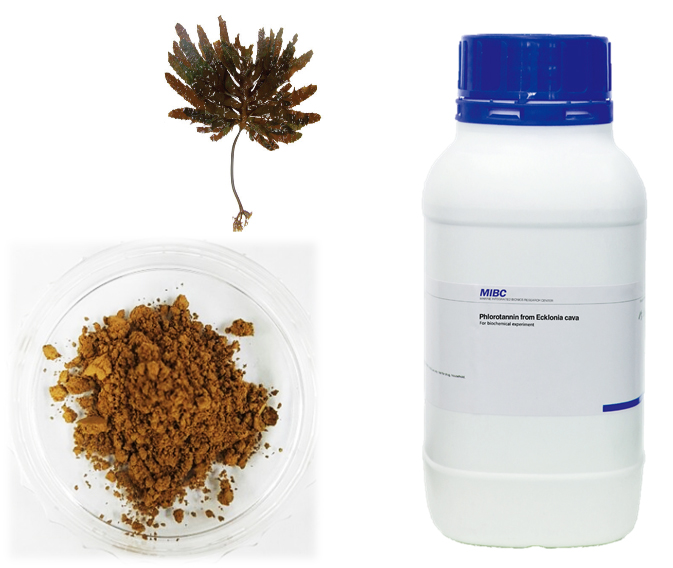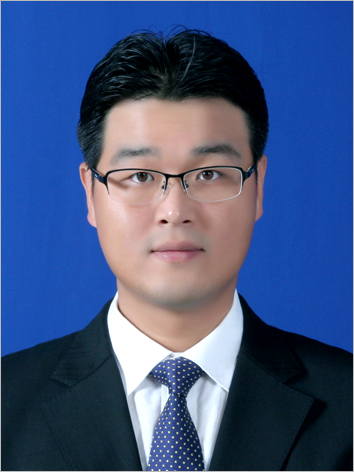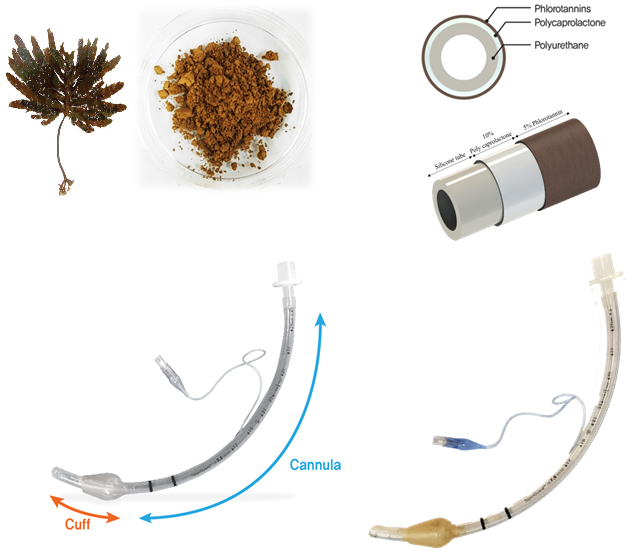커뮤니티
부경투데이
- 국립 부경대학교의 다양한 모습과 소식을 접하시면 부경대학교가 한번 더 가까워집니다.
| 부경대 연구실 25시 | 정원교 교수 (25 Hours of Pukyong Lab. | Prof. Jeong won-kyo) | |||
| 작성자 | 대외협력과 | 작성일 | 2021-01-07 |
| 조회수 | 827 | ||
| 첨부파일 | |||
| 부경대 연구실 25시 | 정원교 교수 (25 Hours of Pukyong Lab. | Prof. Jeong won-kyo) | |||||
 |
대외협력과 |  |
2021-01-07 |  |
827 |

|
이 신문은 지난달 30일 “해양생물에서 추출한 천연물질을 의약품으로 활용하는 해양 바이오 시장이 주목받고 있다.”면서, 정원교 교수와 포스텍 차형준 교수, 국립암센터 최용두 박사 등 3가지 해양바이오 연구성과를 소개했다. 이 신문은 “정원교 부경대 의공학과 교수 연구팀은 감태에서 추출한 플로로타닌이 기도협착증을 억제하는 효능이 있다는 사실을 밝혀냈다.”면서, “기존에는 미토마이신 C라는 항암제를 처방했는데 구토, 설사를 하거나 면역기능이 저하되는 부작용이 있었다. 식용으로 쓰이는 감태는 이런 부작용을 최소화할 수 있는 데다 혈관이나 기도 폐색을 막아주는 다양한 의료기기에 활용할 수 있을 것으로 기대된다.”고 밝혔다. 정원교 교수에 따르면, 연구진(부경대, 고신대 합동)은 해조류 감태 추출물의 기도협착증 억제 기전을 규명하고 동물모델에서의 효과성을 입증했다. 기도협착증은 염증 반응 등으로 기도가 좁아지거나 막히게 되는 현상을 말한다. 정 교수는 “천연소재인 감태 추출물은 기존에 기도 협착 예방을 위해 사용되던 약물 대비 면역저하, 구토, 설사 등 부작용을 최소화 할 수 있어 기존시장을 대체할 수 있을 것으로 평가된다.”고 밝혔다. 이 연구결과는 ‘국제조직재생의학회지’에 게재되었으며, 국내외 특허 출원 및 등록(2017, 2019년)을 통해 원천기술에 대한 지적재산권도 확보하였다. 정 교수팀이 개발한 이 해양바이오소재는 카데터*, 스탠트**, 유착방지제*** 등 고부가가치 의료소재에 다양하게 적용할 수 있을 것이 기대된다. 정 교수는 “관련 기술은 2016년 의료기기 제조업체인 ㈜코웰메디에 기술이전을 완료했다.”면서, “현재 비임상 독성 및 효능시험을 완료하였으며, 인체적용시험을 통한 임상효능 및 안전성 자료 확보를 준비하고 있다.”고 밝혔다. * 기관 내 분비물의 배출 혹은 약액의 주입, 센서 삽입 등을 위한 통로 확보를 목적으로 사용하는 삽입관 이 신문은 이와 함께 홍합의 접착 성분으로 생체접착제 개발을 추진하는 차형준 포스텍(포항공대) 화학공학과 교수 연구팀, 미역 등 갈조류 추출물로 암 수술용 형광표지자를 개발한 국립암센터 최용두 박사 연구팀의 연구성과도 소개했다. 이 신문은 “해양생물은 약 33만 종으로 전체 생물 종류의 약 80%를 차지하고 있다. 향후 해양생물에서 새로운 소재를 찾아낼 가능성이 그만큼 높다는 의미다.”면서, “우리나라도 2000년대 초부터 해양생물에 대한 연구를 본격적으로 시작했다. 기존에는 건강기능성식품 위주였다면 최근에는 의료기기, 신약 등 바이오 헬스 분야 전반에서 성과를 내고 있다.”고 밝혔다. <부경투데이>
Professor Jeong Won-kyo of Pukyong National University (Department of Biomedical Engineering)'s research achievements were introduced in the Dong-A Daily News as a representative marine bio research achievement and attracted people's attention. On the 30th of last month, the newspaper introduced that "the marine bio market, which uses natural substances extracted from marine organisms as medicines, is attracting public attention," and introduced the research results of three marine biologics, including Professor Jeong Won-kyo, Professor Cha Hyung-joon of POSTECH, and Dr. Choi Yong-doo of the National Cancer Center. The newspaper said, "The research team of Professor Jeong Won-kyo of the Department of Biomedical Engineering at Pukyong National University found that the Phlorotannin extracted from Ecklonia cava has the effect of suppressing asthma. Previously, an anticancer drug called mitomycin C was prescribed, but there were side effects such as vomiting, diarrhea, and a lower immune function. Ecklonia, which is used for food, can minimize these side effects, and it is expected that it can be used in various medical devices, such as vasoocclusion and airway obstruction." According to Professor Jeong Won-kyo, the research team (joint research of Pukyong National University and Kosin University) investigated the mechanism of suppression of asthma of seaweed Ecklonia cava extract and proved its effectiveness in animal models. Asthma refers to a phenomenon in which the respiratory tract becomes narrowed or blocked due to an inflammatory response. Professor Jeong said, "The extract of Ecklonia cava, a natural material, is evaluated to be able to replace the existing market as it can minimize side effects such as a lower immune function, vomiting, and diarrhea compared to drugs previously used to prevent airway constriction." The results of this research were published in the 'International Journal of Tissue Engineering and Regenerative Medicine Society', and intellectual property rights for the original technology were also secured through domestic and international patent applications and registrations (2017, 2019). This marine biomaterial, developed by Professor Jeong's research team, is expected to be applied in various ways to high value medical materials such as catheter*, stent**, and anti-adhesion*** . Professor Jeong said, "The technology transfer was completed in 2016 to Cowell Medi, a medical device manufacturer. Currently, non-clinical toxicity and efficacy tests have been completed, and data on clinical efficacy and safety are being prepared through human application tests." * It refers to an insertion tube used for the purpose of securing airways for discharge of secretions in the trachea, injection of chemicals, and insertion of sensors. The newspaper also introduced the research results of Cha Hyung-joon, a research team from Department of Chemical Engineering of POSTECH (Pohang University of Science & Technology), which promotes the development of bio-adhesives as an adhesive component of mussels, and Dr. Choi Yong-doo's research team at the National Cancer Center, which developed fluorescent markers for cancer surgery using brown algae extracts such as seaweed. The newspaper said, "Marine life is about 330,000 species, accounting for about 80% of the total species. This means that there is a high possibility of finding new materials in marine life in the future," and added, "Korea also began researching marine life in earnest from the early 2000s. Previously, health functional foods were the main focus, but in recent years, and showing results in the overall bio-health field such as medical devices and new drugs." <Pukyong Today> |
 감태 플로로탄닌 적용 기도감염 및 협착 방지용 튜브 설계 및 제작1.jpg
감태 플로로탄닌 적용 기도감염 및 협착 방지용 튜브 설계 및 제작1.jpg

 부경대학교 정원교 교수(의공학과)의 연구성과가 대표적인 해양바이오 연구성과로 동아일보에 소개돼 눈길을 끌었다.
부경대학교 정원교 교수(의공학과)의 연구성과가 대표적인 해양바이오 연구성과로 동아일보에 소개돼 눈길을 끌었다.